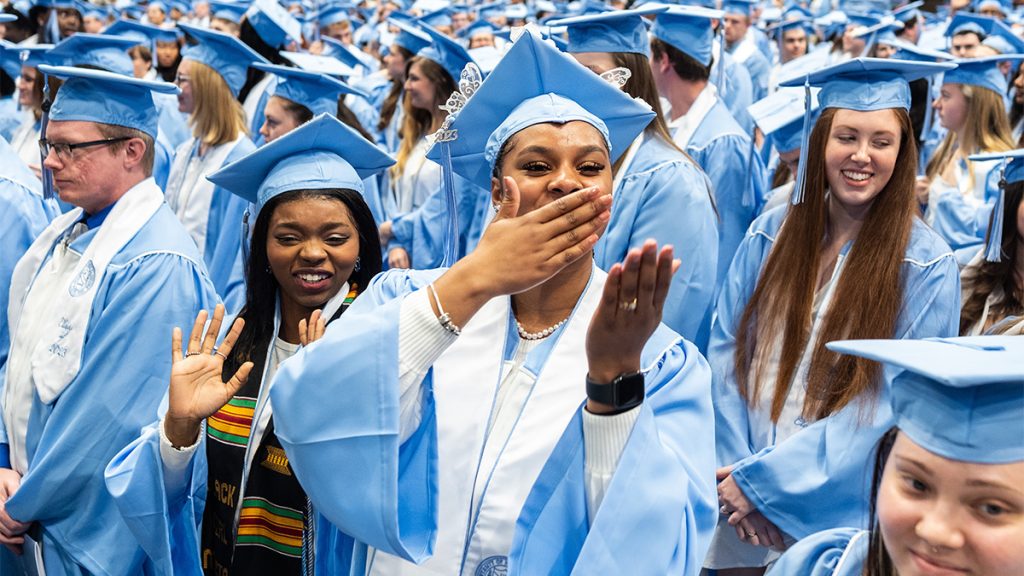The Dec. 17 ceremony gave graduating Tar Heels a chance to reflect on their achievements, celebrate their hard work and think deeply about their future.

More than 1,400 graduates filed into the Dean E. Smith Center Sunday afternoon, prepared to turn their tassels and join a network of more than 360,000 living Tar Heel alumni. The Dec. 17 Winter Commencement ceremony recognized that the Class of 2023 experienced many challenges and excitements — from the COVID-19 pandemic to incredible basketball wins — and offered a chance to reflect on the graduates’ hard work and look forward to a lifetime of unexpected opportunities.
“As a community, we are marking a moment in the lives of you, our graduates. We are celebrating the hard work, devotion and dedication you have shown in quiet moments throughout your time at Carolina,” said Chancellor Kevin M. Guskiewicz. “A thousand little moments have added up to this big one, and it’s those contributions and accomplishments we honor today.”
Presiding over the ceremony, Guskiewicz reminded all they were not marking the end of a journey, but celebrating the start of the next chapter and encouraged graduates to seize whatever opportunities come their way.
“Your story is not over. You are still at the beginning, and we are marking the turning of the page to the next chapter. You have to keep reading to see where the story goes,” Guskiewicz said. “And so, my advice to you is this: go for it. Make this next chapter an unexpected one. You don’t always know what the future is going to hold.”
Before introducing the event’s speaker, Senior Class President Lauryn Lovett offered congratulations to fellow classmates.
“If no one else has said it yet today, let me be the first to say I’m proud of you,” she said. “Being here today is the result of all your hard work, dedication and perseverance. But while this might be the end of your time at UNC, you are still and forever will be a Tar Heel.”
Dr. Samantha Meltzer-Brody, Assad Meymandi Distinguished Professor and chair of the UNC School of Medicine’s psychiatry department and director of the UNC Center for Women’s Mood Disorders, delivered the ceremony’s address. A trailblazer in the mental health field, Meltzer-Brody noted her appreciation for the poignancy of the moment as a mother of college-aged children.
Acknowledging a tendency of psychiatrists to begin by asking questions, she invoked a famous query from poet Mary Oliver then offered advice on thinking deeply and meaningfully about life during a complex time in history.
“‘Tell me, what is it you plan to do with your one wild and precious life?’” Meltzer-Brody quoted. “This is a big question. We are currently living in a time where there is an enormous amount of discord and polarization. As a society, we are having significant difficulty in finding common ground on any number of issues. It is one factor of many, contributing to the national mental health crisis, particularly in our youth. I believe the path forward will require us to focus on the most common elements of our humanity.”
Meltzer-Brody went on to identify compassion and listening as key elements for connecting with others, showing respect and finding common ground. In closing, she challenged the graduates to think again about what they plan to do with their lives.
“I hope you take the founding principles of Carolina — Lux Libertas, light and liberty — out into the world to do good, to live a life that is filled with compassion and to deeply listen to the perspectives of others,” she said. “Compassion and deep listening will help you build the bridges for a better tomorrow and will help to address some of the greatest challenges of our time. Make us proud and congratulations.”
By Kaitlyn Rieper, University Communications
